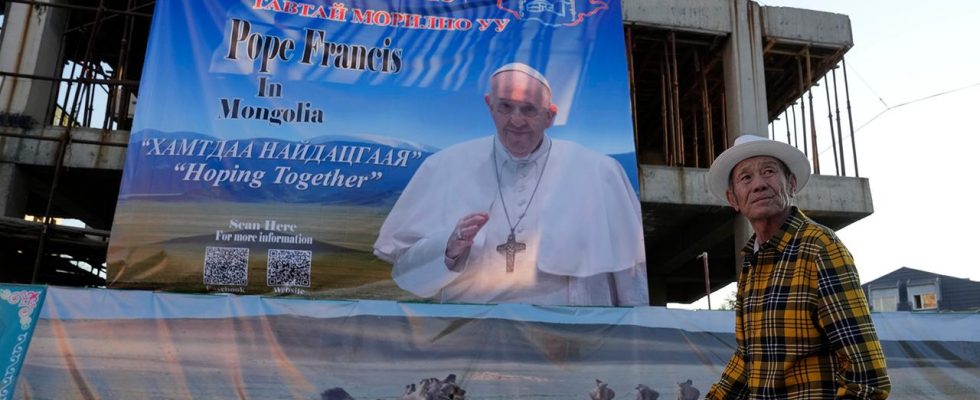The Catholic community in Mongolia has only 1,500 believers, and the journey there is difficult for the ailing pope. But Francis deliberately chose the small neighbors of China and Russia.
It is a journey that seems absurd at first glance. An 86-year-old church leader with poor health travels halfway around the world to visit a congregation of just 1,500 believers. There are so few Catholics in Mongolia that they would not even fill half of Cologne Cathedral. Nevertheless, Pope Francis comes to Ulan Bator.
When popes travel, says Gudrun Sailer from Radio Vatican, they don’t think in numbers, and that applies particularly to Francis: “Right from the start he prefers the fringes. The small, the few, the poor, the separated, the sorted out – the ones seldom heard of.”
A model Catholic community
In addition, the mini-congregation in Mongolia is what Pope Francis wants the Catholic Church to be all over the world. Without scandals, not aloof and intellectual, not ideological and backward-looking, but socially committed, on the side of the poorest, the homeless, the migrants, the victims of violence. Pope Francis says he has long wanted to visit Mongolia: “It is an opportunity to embrace a Church, small in numbers but alive in faith and great in charity.”
A sign of how much Francis cares about little Mongolia as a model for the universal Church: a year ago, the Pope admitted Giorgio Marengo, the head of the Catholics in Mongolia, to the College of Cardinals. At 49, the religious and missionary is the youngest cardinal in the world.
Only 1,500 Catholics live in all of Mongolia – they wouldn’t even fill half of Cologne Cathedral.
Also a piece of great politics
But Francis’ visit is not just a bow to a small Catholic community that is exemplary for him. It is also a piece of great politics. Because in Mongolia, the Pope is going into a country that is completely surrounded by two superpowers, with whom the Vatican does not have an easy time. Gudrun Sailer recalls that “neither in Russia nor in China has there ever been a pope”.
The fact that Francis is now traveling to the middle between Russia and China is sending a signal to the neighboring countries, says the Radio Vatican editor: “The Catholic Church is welcome in Mongolia, even if that wasn’t always the case. And what about Mongolia is possible, maybe at some point it will be possible elsewhere.”
“Wish for Togetherness”
Since 1992, since the end of communism in Ulan Bator, there has been freedom of religion again in Mongolia. Pope spokesman Matteo Bruni speaks of a country that is “reborn”. It is characterized by the search for peace and multilateralism, the desire for equal states to coexist on an equal footing.
There has been speculation in recent weeks that the pope might make a surprise stop in Moscow on the outward or return flight of his Mongolia trip for a peace mission he has long wanted. The Vatican coolly irons out such assumptions. Pope spokesman Bruni says Russia is not on the itinerary.
The Catholic community in Mongolia is considered to be socially committed, always on the side of the poorest, the homeless, migrants and the victims of violence.
Always with Beijing in mind
The meeting with the religious groups in Mongolia is tricky with a view to Beijing. Such an interreligious dialogue is part of many papal trips. This time, however, the shadow of the Dalai Lama hovers over the gathering. Francis has already spoken to many important religious leaders – but not to the Dalai Lama. Out of consideration for Beijing. At a meeting, the Vatican feared further repression for Catholics in China.
In Mongolia, Francis could now meet with whoever the Dalai Lama named Tibetan Buddhism’s third most important spiritual leader last year. The Vatican is said to have rejected a one-on-one meeting, again out of consideration for China. But the Dalai Lama’s nominee, an eight-year-old Mongolian boy, could be part of the delegation that meets with the pope at the interfaith meeting in Ulaanbaatar. According to the Vatican, the delegations of the individual religious groups would decide for themselves who would be appointed for the meeting with the Pope.

